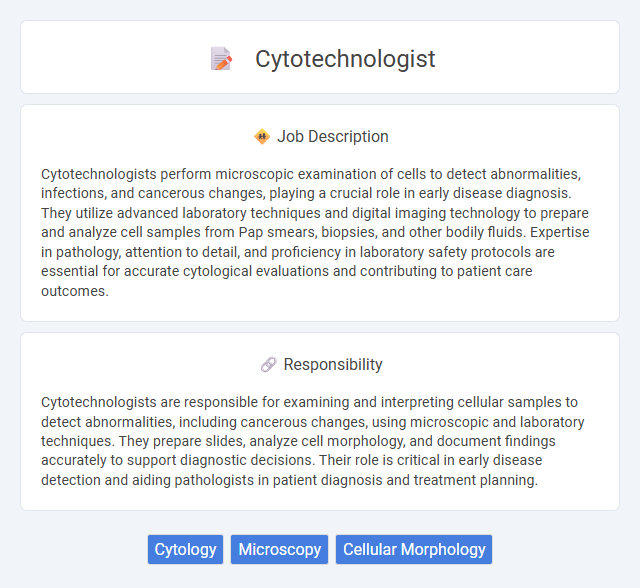
Cytotechnologists perform microscopic examination of cells to detect abnormalities, infections, and cancerous changes, playing a crucial role in early disease diagnosis. They utilize advanced laboratory techniques and digital imaging technology to prepare and analyze cell samples from Pap smears, biopsies, and other bodily fluids. Expertise in pathology, attention to detail, and proficiency in laboratory safety protocols are essential for accurate cytological evaluations and contributing to patient care outcomes.
Individuals with strong attention to detail and a passion for healthcare will likely find the role of a cytotechnologist suitable. Those who can handle repetitive tasks and maintain focus under microscope examination may have a higher probability of thriving in this job. People who prefer dynamic, hands-on patient interaction might be less compatible with the laboratory-based nature of cytotechnology.
Qualification
Cytotechnologists typically require a bachelor's degree in cytotechnology or a related biological science, along with certification from an accredited organization such as the American Society for Clinical Pathology (ASCP). Strong knowledge of cellular biology, pathology, and laboratory techniques is essential for accurate identification of cellular abnormalities. Advanced skills in microscopy and attention to detail ensure high diagnostic precision in screening for cancer and other diseases.
Responsibility
Cytotechnologists are responsible for examining and interpreting cellular samples to detect abnormalities, including cancerous changes, using microscopic and laboratory techniques. They prepare slides, analyze cell morphology, and document findings accurately to support diagnostic decisions. Their role is critical in early disease detection and aiding pathologists in patient diagnosis and treatment planning.
Benefit
Working as a cytotechnologist likely offers strong job stability due to growing demand in medical diagnostics and cancer screening. Opportunities for competitive salaries and comprehensive health benefits may be common, making it an attractive healthcare career. The role probably allows for intellectual engagement and professional growth through continuous learning in cellular pathology.
Challenge
Cytotechnologists likely face the challenge of accurately identifying abnormal cells under a microscope, which requires intense concentration and expertise to avoid diagnostic errors. The probability of encountering rare or subtle cellular changes demands continuous education and vigilance. These challenges may impact the workload and stress levels but also contribute to the critical role they play in early cancer detection and patient care.
Career Advancement
Cytotechnologists specializing in cellular analysis possess valuable skills that open pathways to advanced roles in pathology and laboratory management. Acquiring certifications such as ASCP (American Society for Clinical Pathology) and pursuing continuing education can significantly enhance career prospects and salary potential. Leadership positions in clinical laboratories and opportunities in research and education become accessible as professionals gain experience and expertise in cytotechnology.
Key Terms
Cytology
Cytotechnologists specialize in cytology, examining cells from body tissues to detect abnormalities such as cancer, infections, and precancerous conditions. They utilize advanced microscopy techniques and staining methods to analyze cell samples from Pap smears, fine needle aspirates, and body fluids. Proficiency in identifying cellular morphology and correlating findings with clinical data is essential for accurate diagnosis and patient care.
Microscopy
Cytotechnologists specialize in examining cellular samples under high-powered microscopes to detect abnormalities such as cancer or infectious diseases. Mastery of various microscopy techniques, including brightfield, phase contrast, and fluorescence microscopy, is essential for accurate diagnosis and analysis. Their expertise in microscopic evaluation supports early disease detection and contributes significantly to patient care and pathology research.
Cellular Morphology
Cytotechnologists specialize in the microscopic examination of cellular morphology to detect abnormalities and diagnose diseases such as cancer. Their expertise involves analyzing cell samples from body fluids, tissues, and smears, identifying changes in cell size, shape, and structure. Proficiency in cellular morphology enables cytotechnologists to provide critical insights that guide patient treatment and clinical decision-making.
 kuljobs.com
kuljobs.com